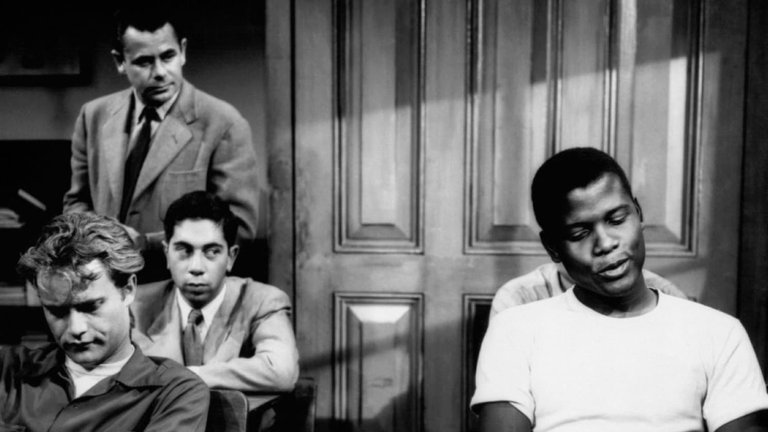Film Review: Blackboard Jungle (1955)

American cultural hegemony over the rest of the world was established and maintained through Hollywood films and rock music. The former predated the latter and actually played important part in its birth, thanks to Blackboard Jungle, the 1955 drama written and directed by Richard Brooks. While the film created a significant stir in its time, it remains relatively unknown compared to other Hollywood productions of the era.
The film is based on Evan Hunter's 1954 novel of the same name. Hunter, prolific writer known for his popular 87th Precinct crime novel series under the pseudonym Ed McBain, drew inspiration from his own brief and traumatic experience as a teacher at a Bronx Vocational High School. His fictional alter ego, played by Glenn Ford, is Richard Dadier, US Navy WW2 veteran who takes a job of an English teacher in North Manual Trades High School, racially diverse school in “problematic” part of New York City. Dadier soon finds his idealism challenged by most of his students being disinterested in learning, even those, like Gregory Miller (played by Sidney Poitier), seem more intelligent than other. Others are even worse, being involved in all kinds of antisocial behaviour and criminal like gang leader Artie West (played by Vic Morrow), who sees Dadier as challenge to his authority. The inevitable conflict will exact heavy toll on Dadier and threaten marriage to his pregnant wife Anne (played by Anne Francis).
The film's lasting impact is largely attributed to its use of Bill Haley & His Comets' "Rock Around the Clock" in the opening and closing credits. Originally released in 1954, the song had not garnered much attention until director Richard Brooks sought a soundtrack that captured the musical tastes of the "troubled" teenagers of the time. According to various anecdotes, Peter Ford, Glenn Ford's teenage son, suggested the record from his personal collection, and Brooks took the plunge. The song not only helped the film reach its target teenage audience but also benefited from the movie's popularity, skyrocketing to the top of the charts. "Rock Around the Clock" was the first such hit in the history of rock and roll, paving the way for many more to come.
When seen from today's perspective, focusing on the narrative between the opening and closing credits, Blackboard Jungle is not as special as it may have seemed in its time. Envisioned as a "social problem" film, it attempts to warn "normie" audiences about juvenile delinquency in 1950s America, particularly in big and racially diverse cities, and the need to help the country's teachers fulfil their mission of setting youth on the straight and narrow path. However, the film also tries to exploit "normie" audiences' shock over the lack of discipline and violence in troubled schools, often by adding extra exploitation content like violent robberies, gangs beatings and attempted rape in a manipulative and melodramatic way.
An interesting aspect of the film is its racial politics, which play a part in the story. Brooks plays around clichés by having potentially intimidating black student Miller become the class's unofficial leader and voice of reason, while white student Artie West becomes the film's villain. Racial sensitivity is reflected in the teachers, like today, being concerned about saying "the wrong" words, and this sensitivity is even abused by the film's villain, who wants to get rid of Dadier.
Unfortunately, the script fails to make the film look original or even coherent. The common trope of an idealistic teacher trying to set "troubled" youth right through his charisma and original teaching methods is compromised by a clumsy narrative that doesn't actually show how Dadier establishes his authority. Some scenes, like Dadier saving a female teacher from sexual assault, appear unconvincing, while the dramatic showdown at the end seems forced.
However, what makes this film watchable is the cast. Glenn Ford bravely handles a poorly written character, accompanied by supporting actors like veteran character actor Louis Calhern, for whom this was the last major film, and bright new talents like Vic Morrow and Sidney Poitier, who do a solid job despite playing teenagers in their late 20s in real life. Ironically, Sidney Poitier will go on to play a great role as a teacher in the popular 1967 film To Sir with Love. Richard Kiley gives an impressive performance as Dadier's jazz-obsessed colleague, while Anne Francis, one of the most beautiful actresses of the 1950s Hollywood, despite being cast mostly as eye candy, bravely handles her over-melodramatic role.
Despite its historical importance, Blackboard Jungle is a typically Hollywood film with flaws that would be easily recognized by today's audience. When compared with Rebel Without a Cause, a drama made at the same time that dealt with similar issues with much more realism, style, and honesty, becoming a true voice of the rock'n'roll generation, Blackboard Jungle's shortcomings become even more apparent. Nevertheless, the film remains an interesting piece of history, showcasing the early days of rock and roll and the cultural shifts that were taking place in 1950s America.
RATING: 5/10 (++)
Blog in Croatian https://draxblog.com
Blog in English https://draxreview.wordpress.com/
InLeo blog https://inleo.io/@drax.leo
Hiveonboard: https://hiveonboard.com?ref=drax
Rising Star game: https://www.risingstargame.com?referrer=drax
1Inch: https://1inch.exchange/#/r/0x83823d8CCB74F828148258BB4457642124b1328e
BTC donations: 1EWxiMiP6iiG9rger3NuUSd6HByaxQWafG
ETH donations: 0xB305F144323b99e6f8b1d66f5D7DE78B498C32A7
BCH donations: qpvxw0jax79lhmvlgcldkzpqanf03r9cjv8y6gtmk9
Posted Using InLeo Alpha